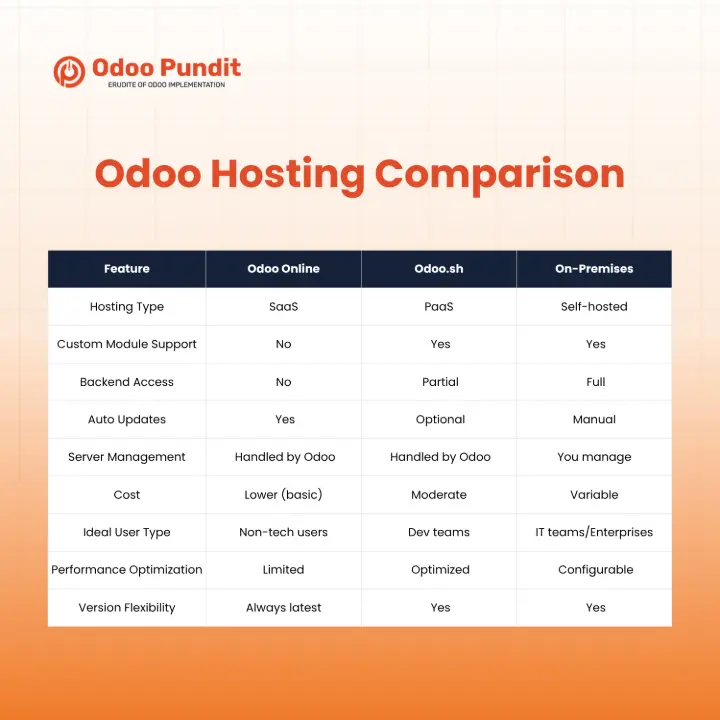When it comes to implementing Odoo ERP for your business, one of the most critical decisions you’ll face is choosing the right hosting option. Odoo offers three main deployment choices:
- Odoo Online (SaaS)
- Odoo.sh (PaaS)
- Odoo On-Premises (Self-Hosted)
Each option offers unique advantages depending on your company’s technical requirements, customization needs, IT infrastructure, and budget.
If you're wondering which Odoo hosting solution is best suited to your business, this guide breaks it down in a clear, detailed, and easy-to-understand manner.
Why Hosting Matters in Odoo ERP Deployment
Before diving into comparisons, it’s essential to understand why the hosting method matters:
- It impacts performance, security, and uptime
- Determines how much control you have over your system
- Affects customization flexibility
- Influences scalability and long-term costs
Choosing the wrong hosting solution can lead to higher costs, technical limitations, and poor user experience.
1. What is Odoo Online?
Odoo Online is the simplest and fastest way to get started with Odoo. It’s a cloud-based version hosted by Odoo itself, which means you don’t need to worry about servers, updates, or maintenance.
Key Features:
- Hosted and maintained by Odoo (you don’t need your own server)
- Runs on the latest version of Odoo Enterprise
- Free for 1 app and 1 user (great for small trials)
- Automatic upgrades and security patches
- Includes essential Odoo apps like CRM, Sales, Inventory, and Accounting
Ideal For:
- Startups and small businesses with limited IT resources
- Teams that need quick access to Odoo apps without customizations
- Companies using standard features with no special module needs
Limitations:
- You cannot install custom modules or third-party apps
- No access to the backend or server configuration
- Always runs on the latest version (you can’t choose to stay on older versions)
- No full control over updates or the deployment cycle
Pros:
- Super easy to set up and use, no tech knowledge needed
- Free to try with 1 app and user
- Automatic maintenance, backups, and security
- Fast performance, hosted on reliable Odoo servers
- Official Odoo support included
Cons:
- No custom development possible
- Can’t install custom or community modules
- Restricted to the latest version onlyNot suitable for businesses needing advanced customization
- Can't access server files, logs, or database directly
- Limited to what Odoo offers out-of-the-box
2. What is Odoo.sh?
Odoo.sh is Odoo’s Platform-as-a-Service (PaaS) offering, built specifically for developers and growing businesses. It runs on the Odoo cloud infrastructure but offers full flexibility for customizations and module development.
Key Features:
- Built-in GitHub integration for version control
- Allows installing custom modules and community apps
- Provides staging and production environments
- Automatically performs tests, backups, and deployments
- Hosted and managed by Odoo (on Odoo’s cloud servers)
Ideal For:
- Mid-sized to large businesses needing customization
- Companies working with Odoo implementation partners or in-house developers
- Businesses that want a mix of ease and development control
Limitations:
- Requires a bit of technical knowledge (especially Git)
- Cannot access the full system like in on-premises deployments
- Costs are higher than Odoo Online, depending on users and storage
Pros:
- Supports custom development while still being managed by Odoo
- Easy collaboration through GitHub and versioning tools
- High availability and performance (backed by Odoo's own infrastructure)
- Pre-production environments for testing
- Fully integrated with Odoo apps
Cons:
- Slightly more complex setup for non-technical users
- Still depends on Odoo Cloud, not fully self-owned
- Custom third-party integrations may need expertise
3. What is Odoo On-Premises?
Odoo On-Premises refers to the self-hosted deployment of Odoo ERP on your own server or a private cloud (like AWS, DigitalOcean, etc.). You have complete control over the server and software.
Key Features:
- You control where and how Odoo is hosted
- Full backend and database access
- Can install any custom/community modules
- Works with both Odoo Enterprise and Odoo Community versions
- Complete control over security, updates, and server environment
Ideal For:
- Enterprises with internal IT and DevOps teams
- Businesses with strict compliance and data privacy regulations
- Companies with heavily customized workflows and modules
Limitations:
- Requires in-house technical expertise to set up and maintain
- You’re responsible for security, backups, and performance
- Updates and patches need to be done manually
- Higher upfront infrastructure costs
Pros:
- Maximum flexibility and customization
- Host on any infrastructure (local server or any cloud provider)
- Choose any Odoo version and upgrade when you're ready
- Ideal for integrating with legacy systems or third-party apps
Cons:
- Requires dedicated IT management
- Downtime or poor performance if not properly maintained
- No automatic updates or testing unless manually configured

How to Choose the Right Odoo Hosting Option
Let’s simplify the selection process:
Choose Odoo Online if:
- You need a quick, hassle-free start
- You don't require custom modules
- You're a solo user or a small team
Choose Odoo.sh if:
- You want cloud convenience with flexibility
- You have developers or a partner for customizations
- You're scaling and need a staging environment
Choose Odoo On-Premises if:
- You need full control and privacy
- You have in-house IT resources
- Your project involves heavy customizations or integrations
Final Thoughts:
Your choice of Odoo hosting directly impacts the success, speed, and scalability of your ERP implementation.
- Odoo Online is best for plug-and-play users.
- Odoo.sh balances power and simplicity.
- On-premises offers unmatched control and customization.
Still unsure? Partner with Odoo Pundit, your trusted Odoo expert, to evaluate your technical and business needs and guide you to the perfect Odoo hosting solution. Contact us today for a free consultation, and let us help you deploy Odoo the smart way.